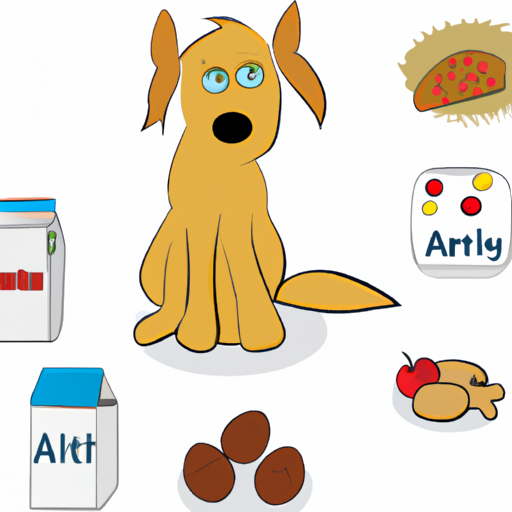As a dog owner, you’re likely always on the lookout for the best ways to keep your canine companion healthy and happy. But, have you ever considered the possibility that your dog might be suffering from a food allergy? It’s a more common issue than you might think and knowing the signs and symptoms could save your pet a lot of discomfort.
Table of Contents
- Introduction and Overview
- The Most Common Food Allergies in Dogs
- Signs and Symptoms of Food Allergies in Dogs
- Diagnosing and Treating Food Allergies in Dogs
- Preventing Food Allergies in Dogs
- Frequently Asked Questions
Key Takeaways
- The most common food allergies in dogs are chicken, beef, dairy, and egg.
- Itching, gastrointestinal problems, and chronic ear or paw infections are common signs of food allergies in dogs.
- Diagnosing food allergies involves an elimination diet followed by food challenges.
- Treatment for food allergies typically involves avoiding the allergen and may include medication and special diets.
- Preventing food allergies involves careful monitoring of your dog’s diet and quick action if symptoms appear.
The Most Common Food Allergies in Dogs
Just like humans, dogs can be allergic to virtually any type of food. However, some allergies are more common than others. According to a study published in the journal BMC Veterinary Research, the most common food allergens for dogs are chicken, beef, dairy, and egg. These are followed by lamb, soy, pork, rabbit, and fish.
Table 1. Most Common Food Allergens in Dogs
| Allergen | Prevalence (%) |
|---|---|
| Chicken | 26 |
| Beef | 18 |
| Dairy | 12 |
| Egg | 6 |
| Soy | 6 |
| Pork | 4 |
Read more about the prevalence of food allergies in dogs.
Signs and Symptoms of Food Allergies in Dogs
Food allergies in dogs can cause a range of symptoms, and every dog may react differently. However, some common signs include itching, redness, and swelling of the skin, particularly around the face, paws, and ears. Dogs may also experience gastrointestinal problems like vomiting and diarrhea.
Table 2. Common Symptoms of Food Allergies in Dogs
| Symptoms | Description |
|---|---|
| Itching | Often around the face, paws, and ears |
| Redness and Swelling | Particularly in the same areas where itching occurs |
| Gastrointestinal Problems | Including vomiting and diarrhea |
| Chronic Ear or Paw Infections | Repeated infections can be a sign of food allergies |
Check out this article for more detailed information about allergies in dogs.
Diagnosing and Treating Food Allergies in Dogs
Diagnosing a food allergy in dogs often involves an elimination diet. This means feeding your dog a diet that doesn’t contain any of the common allergens and then gradually reintroducing potential allergens to see which ones cause a reaction. You’ll need to be patient, as this process can take several weeks or even months.
Once the allergen has been identified, the treatment usually involves avoiding that ingredient in your dog’s diet. Your vet may also prescribe medication to help manage symptoms. Read more about diagnosing and treating food allergies.
Preventing Food Allergies in Dogs
Preventing food allergies in dogs can be tricky, as they often develop over time and can be caused by foods that your dog has been eating without issue for years. However, there are a few steps you can take to minimize the risk.
Firstly, feed your dog a balanced, varied diet that doesn’t rely too heavily on one or two ingredients. Secondly, pay close attention to your dog’s health and behavior, particularly after introducing a new food. If you notice any changes, consult your vet immediately. Lastly, if your dog has been diagnosed with a food allergy, be vigilant about checking food labels and avoid feeding them anything that contains the allergen.
For more tips on maintaining your dog’s health, visit this page.
Frequently Asked Questions
1. Can a dog develop a food allergy later in life?
Yes, a dog can develop a food allergy at any time, even to a food they have eaten for years without issue.
2. Are certain breeds more prone to food allergies?
Some breeds, such as Labrador Retrievers, Cocker Spaniels, and German Shepherds, appear to be more susceptible to developing food allergies, although any dog can develop an allergy.
3. How can I tell if my dog has a food allergy or a food intolerance?
Food allergies and food intolerances can cause similar symptoms, but they are different issues. A food allergy involves an immune system response, while a food intolerance does not. If you’re unsure, it’s best to consult your vet.
In conclusion, understanding food allergies in dogs is key to ensuring your pet’s well-being. By recognizing the signs, getting a proper diagnosis, and taking steps to manage and prevent symptoms, you can help your furry friend live a healthier, happier life.



